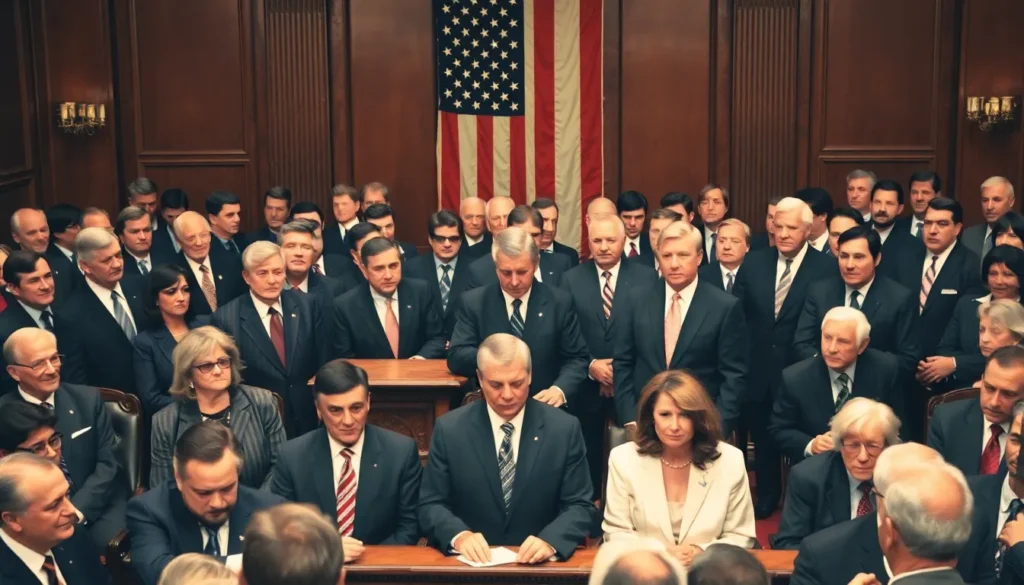In a political landscape that often feels like a reality show, today’s impeachment vote has everyone buzzing. Who knew democracy could be this dramatic? As the dust settles, the spotlight shines on the brave souls who dared to cast their votes, wielding their ballots like superhero capes.
Curiosity piqued? You’re not alone. Each vote tells a story, and today’s decision adds another chapter to the ever-evolving saga of Trump’s presidency. With a mix of fierce partisanship and unexpected alliances, the roster of voters reveals a fascinating glimpse into the minds of those shaping the future. Buckle up as we dive into the details of who stood up and who sat down in this pivotal moment of American history.
Table of Contents
ToggleOverview of Impeachment Votes
The recent impeachment vote holds significant weight in American politics, reflecting heightened tensions within the legislative body. Senators and House members faced intense scrutiny as they cast their ballots, marking a pivotal moment in Trump’s presidency. Votes occurred amid a backdrop of stark partisan divides, yet some members strayed from expected party lines.
Notably, the final tally highlighted a blend of individual convictions and broader political calculations. Democrats largely unified in their support, showcasing their commitment to holding the president accountable. On the contrary, a handful of Republicans crossed party lines, voting in favor of the impeachment articles, which suggests evolving perspectives among some lawmakers.
Data reveals that the vote totals showed at least 10 Republican representatives joined all Democrats to impeach. This unusual mix of votes exemplifies shifting dynamics within the GOP, where different factions are emerging. Analyzing these shifts can provide insights into the broader implications for future elections.
The courage displayed by those casting difficult votes deserves attention. Many representatives expressed concerns for their constituents while making their decisions. The mix of bravery, political strategy, and personal belief makes this impeachment vote a historical moment.
Moving forward, the implications of these votes will resonate well beyond the immediate future. Each participant in this vote significantly shapes the narrative surrounding Trump’s presidency. Tracking these developments will be essential to understand both political reactions and the evolving landscape of American governance.
Key Players in the Impeachment Process

The impeachment process involves key players from both chambers of Congress. Their decisions significantly impact the ongoing political narrative.
House of Representatives
In the House of Representatives, a majority of Democrats voted in favor of impeachment. Their unity reflects a shared stance on holding the president accountable. Notably, at least 10 Republicans also crossed party lines, illustrating a shift in traditional party loyalty. These members faced pressure from constituents when casting their votes. Their courage to support impeachment adds complexity to the party dynamics within the House, highlighting diverse perspectives on governance.
Senate Involvement
The Senate plays a crucial role in the impeachment process after the House vote. Senators will conduct trials and ultimately decide the outcome of impeachment charges. Bipartisan cooperation becomes essential in these proceedings. Some Republican senators may reconsider their positions based on constituents’ sentiments. The potential for unexpected alliances marks a vital aspect of the Senate’s approach. Each senator’s individual stance will contribute to the broader implications for Trump’s presidency and the political landscape.
Voting Breakdown
Recent impeachment votes offer significant insights into party alignments and individual lawmakers’ decisions. Understanding the patterns seen during this pivotal moment helps illuminate current political dynamics.
Party Lines
Democrats displayed overwhelming unity, with nearly all voting in favor of impeachment. Notably, at least 10 Republicans joined the Democrats, defying expectations within the GOP. This crossover indicates a notable fracture in party loyalty. Lawmakers’ choices may reflect growing concerns among constituents, influencing their decisions on such a critical issue. The resulting mix signifies potential shifts in coalition-building within Congress. Overall, this blend of votes showcases a complicated interplay between party allegiance and individual beliefs.
Individual Votes
Each representative’s vote carries weight, illustrating personal convictions amid heated debates. A diverse group of lawmakers stands out due to their unique motivations. Some Republicans who voted for impeachment cited moral or ethical considerations. Others faced significant pressure from constituents, influencing their decisions. Meanwhile, Democrats emphasized accountability and adherence to constitutional principles. Tracking these individual choices reveals the complexities of governance and the difficult positions many lawmakers find themselves in. The implications of each vote ripple throughout the political landscape, resonating beyond the immediate context.
Reactions and Implications
Public sentiment regarding the impeachment vote remains deeply polarized. Supporters of impeachment express relief, viewing this action as a necessary step towards accountability. Detractors, however, perceive it as politically motivated, arguing that it undermines democratic processes. Social media platforms bubble with reactions, showcasing both enthusiasm from accountability advocates and frustration from Trump supporters. Polls indicate that a significant portion of the electorate aligns with Democrat perspectives, but a notable faction still backs Trump, illustrating the divide.
Political ramifications of the impeachment vote extend beyond immediate reactions. The GOP faces internal struggles as the alignment of at least 10 Republicans with Democrats signals potential fractures. Such actions may influence future elections, as party loyalty is tested among constituents. Republican lawmakers may have to navigate complex interactions with voters who have divergent views on accountability and loyalty. Looking ahead, bipartisan collaboration becomes increasingly vital, determining the effectiveness of legislative initiatives in a highly charged political environment.
The impeachment vote marks a significant moment in American political history. It highlights the tensions within the legislative body and showcases the courage of lawmakers who chose to prioritize accountability over party loyalty. As the political landscape shifts, the implications of this vote will likely influence future elections and legislative initiatives.
With a mix of bipartisan support and fierce opposition, the decision reflects the complexities of contemporary governance. As public sentiment remains deeply divided, the actions taken today will resonate in the ongoing narrative of Trump’s presidency and the evolving dynamics within the GOP. The path forward will require careful navigation of these challenges as lawmakers strive for collaboration in a charged environment.





